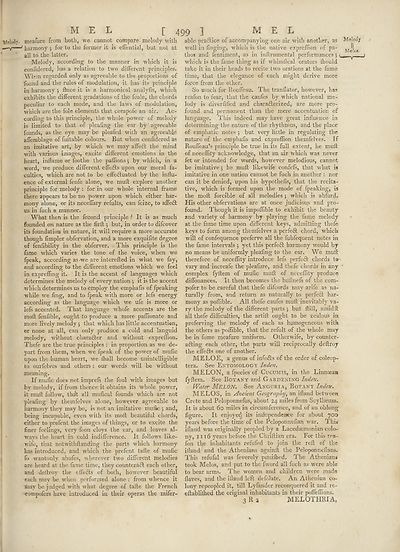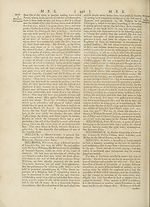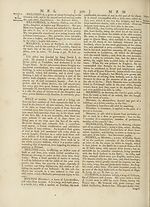Encyclopaedia Britannica, or, a Dictionary of arts, sciences, and miscellaneous literature : enlarged and improved. Illustrated with nearly six hundred engravings > Volume 13, MAT-MIC
(541) Page 499
Download files
Complete book:
Individual page:
Thumbnail gallery: Grid view | List view

M E I
MeWy. meafure from both, we cannot compare melody with
harmony } for to the former it is effential, but not at
all to the latter.
Melody, according to the manner in which it is
conhdered, has a relation to two different principles.
When regarded only as agreeable to the proportions of
found and the rules of modulation, it has its principle
in harmony \ frnce it is a harmonical analyfis, which
exhibits the different gradations of the foale, the chords
peculiar to each mode, and the laws of modulation,
which are the foie elements that compofe an air. Ac¬
cording to this principle, the whole power of melody
is limited to that of pleafing the ear by agreeable
founds, as the eye may be pleafed with an agreeable
affemblage of fuitable colours. But when confidered as
an imitative art, by which we may affedl the mind
with various images, excite different emotions in the
heart, inflame or foothe the paffionsj by which, in a
word, we produce different effefts upon our moral fa¬
culties, which are not to be effectuated by the influ¬
ence of external fenfe alone, wre muff explore another
principle for melody : for in our whole internal frame
there appears to be no power upon which either har¬
mony alone, or its neceffary refults, can feize, to affedl
us in fuch a manner.
What then is the feeond principle ? It is as much
founded on nature as the firft •, but, in order to difeover
its foundation in nature, it will require a more accurate
though fimpler obfervation, and a more exquifite degree
of fenfibility in the obferver. This principle is the
fame which varies the tone of the voice, when Ave
fpeak, according as we are interefled in what avc fay,
and according to the different emotions Avhich avc feel
in expreffmg it. It is the accent of languages which
determines the melody of every nation ; it is the accent
Avhich determines us to employ the emphafis of fpeaking
while we ling, and to fpeak Avith more or lefs energy
according as the language which Ave ufe is more or
lefs accented. That language Avhofe accents are the
molt fenfible, ought to produce a more pafiionate and
more lively melody j that Avhich has little accentuation,
or none at all, can only produce a cold and languid
melody, Avithout charadler and without expreflion.
Thefe are the true principles : in proportion as Ave de¬
part from them, when Ave fpeak of the poA\mr of mufic
upon the human heart, Ave fhall become unintelligible
to ourfelves and others : our Avords avIH be Avithout
meaning.
If muiic does not imprefs the foul Avith images but
by melody, if from thence it obtains its whole poAver,
it mull folloAV, thdt all mufical founds Avhich are not
pleafing by themfelves alone, hoAvever agreeable to
harmony they may be, is not an imitative mufic ; and,
being incapable, even with its molt beautiful chords,
either to prefent the images of things, or to excite the
finer feelings, Arery foon cloys the ear, and leaves al-
Avays the heart in cold indifference. It folloAvs like-
wife, that notwithftanding the parts Avhich harmony
has introduced, and Avhich the prefent tafte of mufic
fo wantonly abufes, wherever two different melodies
are heard at the fame time, they counteract: each other,
and deftroy the effects of both, hoAvever beautiful
each may be when performed alone : from Avhence it
may be judged with what degree of tafte the French
«ompofers have introduced in their operas the mifer-
M E L
able pratice of accompanying one air Avith another, as Melody
Avell in hinging, which is the native expreflion of pa- M(los
thos and fentiment, as in inftrumental performances : .
Avhich is the fame thing as if Avhimfical orators fhould
take it in their heads to recite tAvo orations at the fame
time, that the elegance of each might derive more
force from the other.
So much for Roufleau. The tranflator, hoAvever, has
reafon to fear, that the caufes by which national me¬
lody is dAerflfied and charadlerized, are more pro¬
found and permanent than the mere accentuation of
language. This indeed may have great influence in
determining the nature of the rhythmus, and the place
of emphatic notes 5 but very little in regulating the
nature of the emphafis and expreflion themfelves. If
Roufteau’s principle be true in its full extent, he muft
of neeeflity acknoAvlcdge, that an air which Avas never
fet or intended for Avords, however melodious, cannot
be imitative ; he muft likewife confefs, that Avhat is
imitative in one nation cannot be fuch in another : nor
can it be denied, upon his hypothefts, that the recita¬
tive, Avhich is formed upon the mode of fpeaking, is
the moft forcible of all melodies 5 which is abfurd.
His other obfervations are at once judicious and pro¬
found. Though it is impoflxble to exhibit the beauty
and variety of harmony by playing the fame melody
at the fame time upon different keys, admitting thofe
keys to form among themfelves a perfedf chord, Avhich
Avill of confequence preferve all the fubfequent notes in
the fame intervals 5 yet this perfect harmony Avould by
no means be uniformly pleafing to the ear. We muft:
therefore of neceflity introduce lefs perfect chords to
vary and increafe the pleafure, and thefe chords in any
complex fyftem of mufic muft of neceflity produce
diffonances. It then becomes the bufinefs of the com-
pofer to be careful that thefe difeords may arife as na¬
turally from, and return as naturally to perfeft har¬
mony as poflible. All thefe caufes muft inevitably va¬
ry the melody of the different parts ; but ftill, amidft
all tbefe difficulties, the artift ought to be zealous in
preferving the melody of each as homogeneous with
the others as poflible, that the refult of the Avhole may
be in fome meafure uniform. Otherwife, by counter-
acling each other, the parts Avill reciprocally deftroy
the effeffs one of another.
MELOE, a genus of infedis of the order of coleop-
tera. See Entomology Index.
MELON, a fpecies of Cucumis, in the Linncean
fyftem. See Botany and Gardening Index.
Water Melon. See Anguria, Botany Index.
MELOS, in /Indent Geography, an ifland between
Crete and Peloponnefus, about 24 miles from Scyllseum.
It is about 60 miles in circumference, and of an oblong
figure. It enjoyed its independence for about 700
years before the time of the Peloponnefian war. This
ifland was originally peopled by a Lacedaemonian colo¬
ny, 1116 years before the Chriftian era. For this rea¬
fon the inhabitants refufed to join the reft of the
ifland and the Athenians againft the Peloponnefians.
This refufal was feverely punifhed. The Athenians
took Melos, and put to the fword all fuch as Avere able
to bear arms. The women and children wrere made
flaA^es, and the ifland left defolate. An Athenian co¬
lony repeopled it, till Lyfander reconquered it and re-
eftablifhed the original inhabitants in their poflefiions.
3 R 3 MELOTHRIA.
[ 499 1
MeWy. meafure from both, we cannot compare melody with
harmony } for to the former it is effential, but not at
all to the latter.
Melody, according to the manner in which it is
conhdered, has a relation to two different principles.
When regarded only as agreeable to the proportions of
found and the rules of modulation, it has its principle
in harmony \ frnce it is a harmonical analyfis, which
exhibits the different gradations of the foale, the chords
peculiar to each mode, and the laws of modulation,
which are the foie elements that compofe an air. Ac¬
cording to this principle, the whole power of melody
is limited to that of pleafing the ear by agreeable
founds, as the eye may be pleafed with an agreeable
affemblage of fuitable colours. But when confidered as
an imitative art, by which we may affedl the mind
with various images, excite different emotions in the
heart, inflame or foothe the paffionsj by which, in a
word, we produce different effefts upon our moral fa¬
culties, which are not to be effectuated by the influ¬
ence of external fenfe alone, wre muff explore another
principle for melody : for in our whole internal frame
there appears to be no power upon which either har¬
mony alone, or its neceffary refults, can feize, to affedl
us in fuch a manner.
What then is the feeond principle ? It is as much
founded on nature as the firft •, but, in order to difeover
its foundation in nature, it will require a more accurate
though fimpler obfervation, and a more exquifite degree
of fenfibility in the obferver. This principle is the
fame which varies the tone of the voice, when Ave
fpeak, according as we are interefled in what avc fay,
and according to the different emotions Avhich avc feel
in expreffmg it. It is the accent of languages which
determines the melody of every nation ; it is the accent
Avhich determines us to employ the emphafis of fpeaking
while we ling, and to fpeak Avith more or lefs energy
according as the language which Ave ufe is more or
lefs accented. That language Avhofe accents are the
molt fenfible, ought to produce a more pafiionate and
more lively melody j that Avhich has little accentuation,
or none at all, can only produce a cold and languid
melody, Avithout charadler and without expreflion.
Thefe are the true principles : in proportion as Ave de¬
part from them, when Ave fpeak of the poA\mr of mufic
upon the human heart, Ave fhall become unintelligible
to ourfelves and others : our Avords avIH be Avithout
meaning.
If muiic does not imprefs the foul Avith images but
by melody, if from thence it obtains its whole poAver,
it mull folloAV, thdt all mufical founds Avhich are not
pleafing by themfelves alone, hoAvever agreeable to
harmony they may be, is not an imitative mufic ; and,
being incapable, even with its molt beautiful chords,
either to prefent the images of things, or to excite the
finer feelings, Arery foon cloys the ear, and leaves al-
Avays the heart in cold indifference. It folloAvs like-
wife, that notwithftanding the parts Avhich harmony
has introduced, and Avhich the prefent tafte of mufic
fo wantonly abufes, wherever two different melodies
are heard at the fame time, they counteract: each other,
and deftroy the effects of both, hoAvever beautiful
each may be when performed alone : from Avhence it
may be judged with what degree of tafte the French
«ompofers have introduced in their operas the mifer-
M E L
able pratice of accompanying one air Avith another, as Melody
Avell in hinging, which is the native expreflion of pa- M(los
thos and fentiment, as in inftrumental performances : .
Avhich is the fame thing as if Avhimfical orators fhould
take it in their heads to recite tAvo orations at the fame
time, that the elegance of each might derive more
force from the other.
So much for Roufleau. The tranflator, hoAvever, has
reafon to fear, that the caufes by which national me¬
lody is dAerflfied and charadlerized, are more pro¬
found and permanent than the mere accentuation of
language. This indeed may have great influence in
determining the nature of the rhythmus, and the place
of emphatic notes 5 but very little in regulating the
nature of the emphafis and expreflion themfelves. If
Roufteau’s principle be true in its full extent, he muft
of neeeflity acknoAvlcdge, that an air which Avas never
fet or intended for Avords, however melodious, cannot
be imitative ; he muft likewife confefs, that Avhat is
imitative in one nation cannot be fuch in another : nor
can it be denied, upon his hypothefts, that the recita¬
tive, Avhich is formed upon the mode of fpeaking, is
the moft forcible of all melodies 5 which is abfurd.
His other obfervations are at once judicious and pro¬
found. Though it is impoflxble to exhibit the beauty
and variety of harmony by playing the fame melody
at the fame time upon different keys, admitting thofe
keys to form among themfelves a perfedf chord, Avhich
Avill of confequence preferve all the fubfequent notes in
the fame intervals 5 yet this perfect harmony Avould by
no means be uniformly pleafing to the ear. We muft:
therefore of neceflity introduce lefs perfect chords to
vary and increafe the pleafure, and thefe chords in any
complex fyftem of mufic muft of neceflity produce
diffonances. It then becomes the bufinefs of the com-
pofer to be careful that thefe difeords may arife as na¬
turally from, and return as naturally to perfeft har¬
mony as poflible. All thefe caufes muft inevitably va¬
ry the melody of the different parts ; but ftill, amidft
all tbefe difficulties, the artift ought to be zealous in
preferving the melody of each as homogeneous with
the others as poflible, that the refult of the Avhole may
be in fome meafure uniform. Otherwife, by counter-
acling each other, the parts Avill reciprocally deftroy
the effeffs one of another.
MELOE, a genus of infedis of the order of coleop-
tera. See Entomology Index.
MELON, a fpecies of Cucumis, in the Linncean
fyftem. See Botany and Gardening Index.
Water Melon. See Anguria, Botany Index.
MELOS, in /Indent Geography, an ifland between
Crete and Peloponnefus, about 24 miles from Scyllseum.
It is about 60 miles in circumference, and of an oblong
figure. It enjoyed its independence for about 700
years before the time of the Peloponnefian war. This
ifland was originally peopled by a Lacedaemonian colo¬
ny, 1116 years before the Chriftian era. For this rea¬
fon the inhabitants refufed to join the reft of the
ifland and the Athenians againft the Peloponnefians.
This refufal was feverely punifhed. The Athenians
took Melos, and put to the fword all fuch as Avere able
to bear arms. The women and children wrere made
flaA^es, and the ifland left defolate. An Athenian co¬
lony repeopled it, till Lyfander reconquered it and re-
eftablifhed the original inhabitants in their poflefiions.
3 R 3 MELOTHRIA.
[ 499 1
Set display mode to:
![]() Universal Viewer |
Universal Viewer | ![]() Mirador |
Large image | Transcription
Mirador |
Large image | Transcription
Images and transcriptions on this page, including medium image downloads, may be used under the Creative Commons Attribution 4.0 International Licence unless otherwise stated. ![]()
| Permanent URL | https://digital.nls.uk/192668195 |
|---|
| Attribution and copyright: |
|
|---|
| Description | Ten editions of 'Encyclopaedia Britannica', issued from 1768-1903, in 231 volumes. Originally issued in 100 weekly parts (3 volumes) between 1768 and 1771 by publishers: Colin Macfarquhar and Andrew Bell (Edinburgh); editor: William Smellie: engraver: Andrew Bell. Expanded editions in the 19th century featured more volumes and contributions from leading experts in their fields. Managed and published in Edinburgh up to the 9th edition (25 volumes, from 1875-1889); the 10th edition (1902-1903) re-issued the 9th edition, with 11 supplementary volumes. |
|---|---|
| Additional NLS resources: |
|

